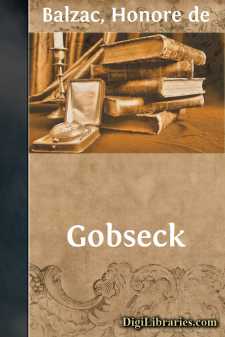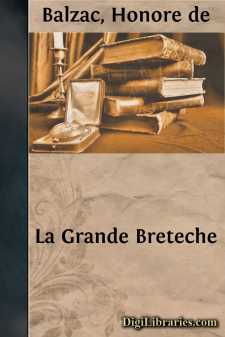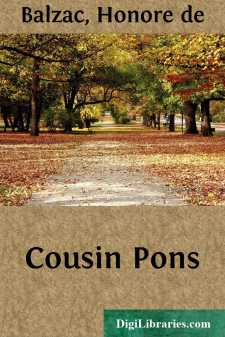Literary Collections
- American 84
- Ancient, Classical & Medieval 14
- Asian 1
- Australian & Oceanian 1
- Canadian 55
- Continental European
- English, Irish, Scottish, Welsh 179
- Essays 160
- General 24
- Letters 46
- Middle Eastern 1
Continental European Books
Sort by:
by:
Honore de Balzac
Z. MARCAS I never saw anybody, not even among the most remarkable men of the day, whose appearance was so striking as this man's; the study of his countenance at first gave me a feeling of great melancholy, and at last produced an almost painful impression. There was a certain harmony between the man and his name. The Z. preceding Marcas, which was seen on the addresses of his letters, and which...
more...
by:
Honore de Balzac
ALMAE SORORI In the year 1308 few houses were yet standing on the Island formed by the alluvium and sand deposited by the Seine above the Cite, behind the Church of Notre-Dame. The first man who was so bold as to build on this strand, then liable to frequent floods, was a constable of the watch of the City of Paris, who had been able to do some service to their Reverences the Chapter of the Cathedral;...
more...
by:
Honore de Balzac
EVE AND DAVID Lucien had gone to Paris; and David Sechard, with the courage and intelligence of the ox which painters give the Evangelist for accompanying symbol, set himself to make the large fortune for which he had wished that evening down by the Charente, when he sat with Eve by the weir, and she gave him her hand and her heart. He wanted to make the money quickly, and less for himself than for...
more...
by:
Honore de Balzac
GAMBARA New Year's Day of 1831 was pouring out its packets of sugared almonds, four o'clock was striking, there was a mob in the Palais-Royal, and the eating-houses were beginning to fill. At this moment a coupe drew up at the perron and a young man stepped out; a man of haughty appearance, and no doubt a foreigner; otherwise he would not have displayed the aristocratic chasseur who attended...
more...
by:
Honore de Balzac
I There are houses in certain provincial towns whose aspect inspires melancholy, akin to that called forth by sombre cloisters, dreary moorlands, or the desolation of ruins. Within these houses there is, perhaps, the silence of the cloister, the barrenness of moors, the skeleton of ruins; life and movement are so stagnant there that a stranger might think them uninhabited, were it not that he...
more...
by:
Honore de Balzac
GAUDISSART II. To know how to sell, to be able to sell, and to sell. People generally do not suspect how much of the stateliness of Paris is due to these three aspects of the same problem. The brilliant display of shops as rich as the salons of the noblesse before 1789; the splendors of cafes which eclipse, and easily eclipse, the Versailles of our day; the shop-window illusions, new every morning,...
more...
by:
Honore de Balzac
GOBSECK It was one o'clock in the morning, during the winter of 1829-30, but in the Vicomtesse de Grandlieu's salon two persons stayed on who did not belong to her family circle. A young and good-looking man heard the clock strike, and took his leave. When the courtyard echoed with the sound of a departing carriage, the Vicomtesse looked up, saw that no one was present save her brother and a...
more...
by:
Honore de Balzac
LA GRANDE BRETECHE "Ah! madame," replied the doctor, "I have some appalling stories in my collection. But each one has its proper hour in a conversation—you know the pretty jest recorded by Chamfort, and said to the Duc de Fronsac: 'Between your sally and the present moment lie ten bottles of champagne.'" "But it is two in the morning, and the story of Rosina has...
more...
by:
Honore de Balzac
AN EPISODE UNDER THE TERROR On the 22nd of January, 1793, towards eight o'clock in the evening, an old lady came down the steep street that comes to an end opposite the Church of Saint Laurent in the Faubourg Saint Martin. It had snowed so heavily all day long that the lady's footsteps were scarcely audible; the streets were deserted, and a feeling of dread, not unnatural amid the silence,...
more...
by:
Honore de Balzac
COUSIN PONS Towards three o'clock in the afternoon of one October day in the year 1844, a man of sixty or thereabouts, whom anybody might have credited with more than his actual age, was walking along the Boulevard des Italiens with his head bent down, as if he were tracking some one. There was a smug expression about the mouth—he looked like a merchant who has just done a good stroke of...
more...











